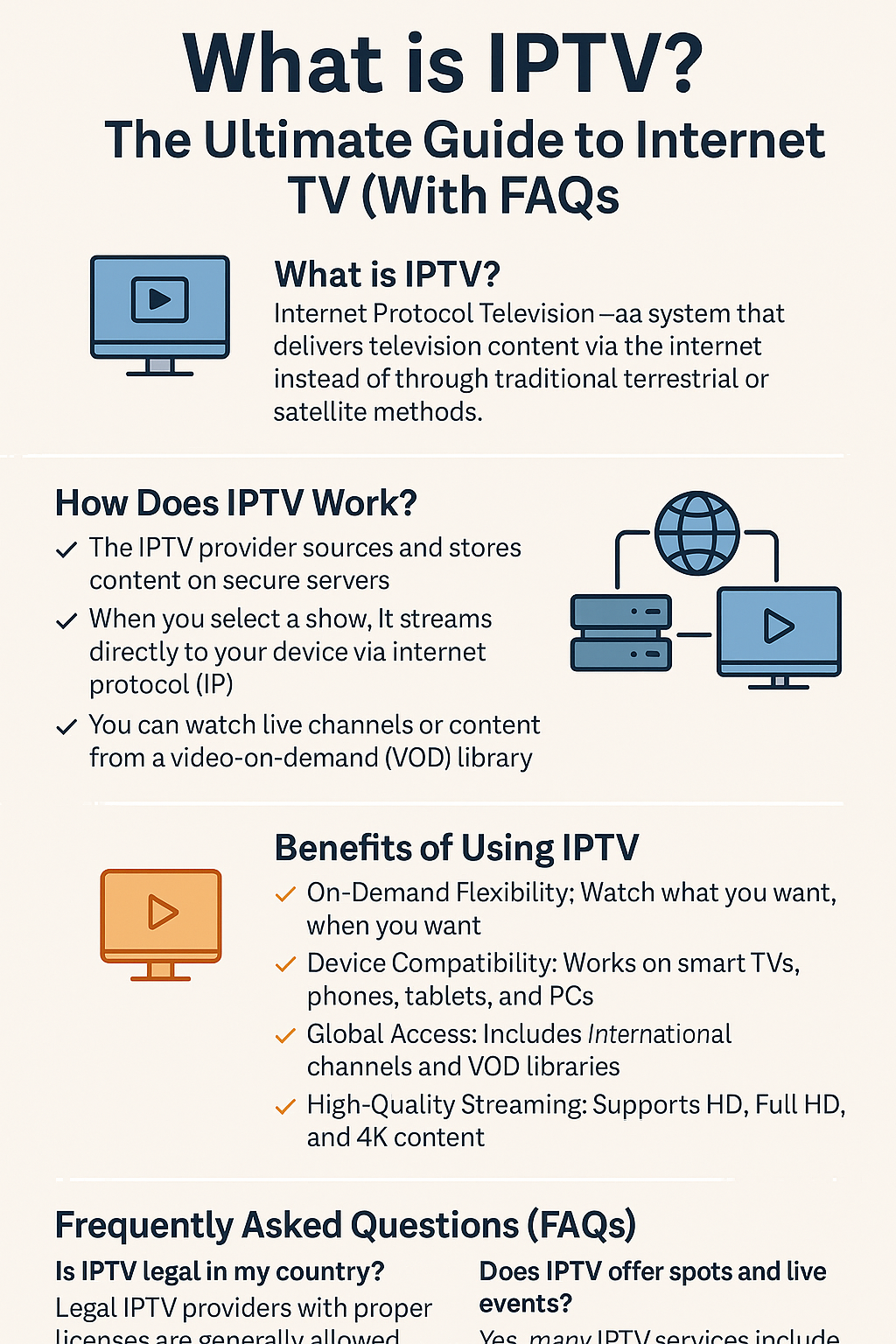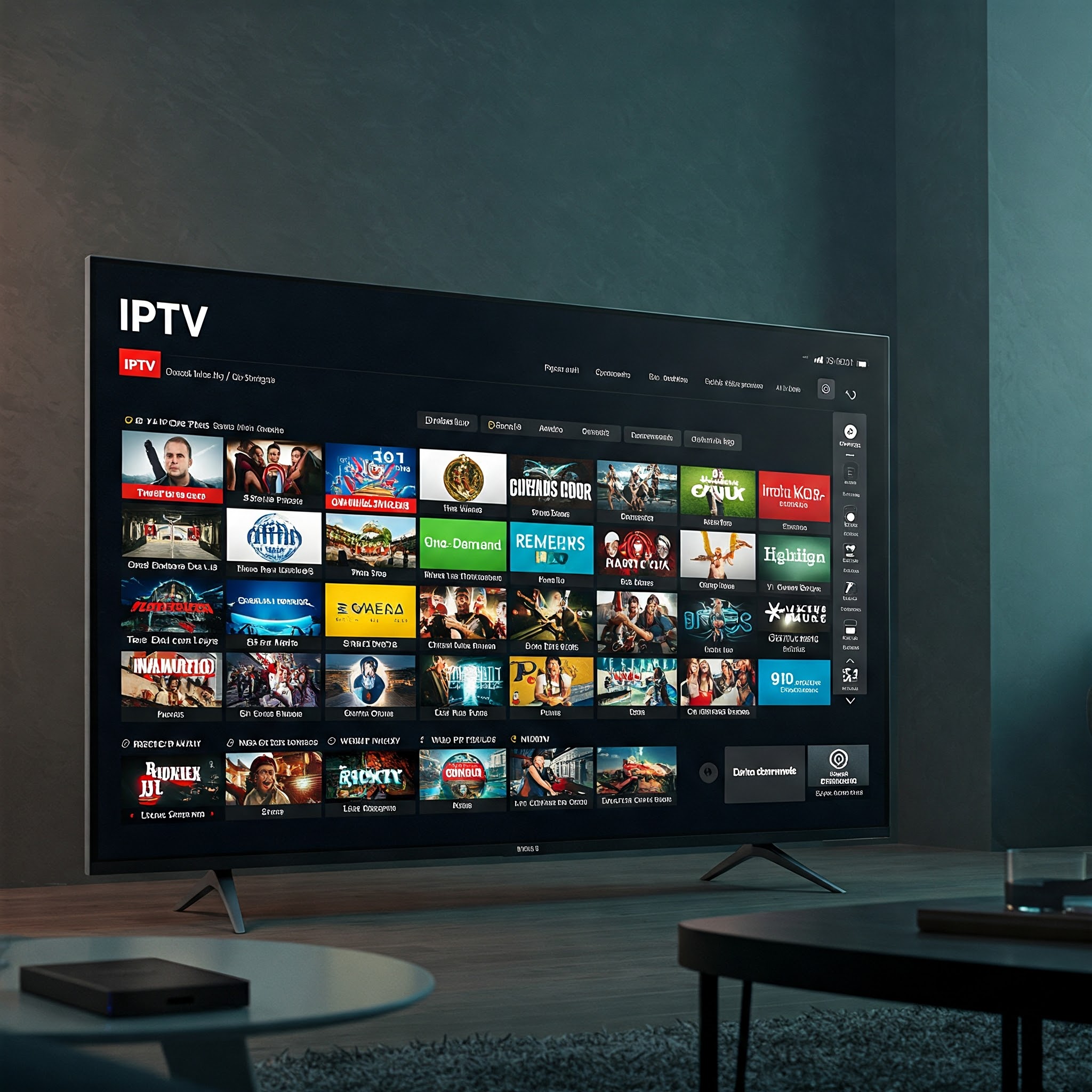In a world where streaming dominates and traditional TV feels outdated, IPTV (Internet Protocol Television) is revolutionizing the way we watch content. With IPTV, viewers have full control over what, when, and how they watch TV—no satellite dishes, no bulky cables, and no strict schedules.
But what exactly is IPTV, how does it work, and why are millions of users switching to it every year?
In this in-depth guide, we’ll cover everything you need to know about IPTV: the technology, benefits, challenges, types of services, legal considerations, and the most frequently asked questions. Whether you’re a casual viewer or a cord-cutting pro, this guide is for you.
Table of Contents
What is IPTV?
IPTV stands for Internet Protocol Television—a system that delivers TV programs and video content using the internet instead of traditional terrestrial, satellite, or cable formats.
Rather than broadcasting all content at once, IPTV sends shows and movies on-demand or streams live channels through your internet connection. This allows users to access content anytime, anywhere, and on any device.
How Does IPTV Work?
IPTV functions much like streaming services (e.g., Netflix or YouTube), but with the added capability of live TV and channel-based programming.
Here’s how it works in a nutshell:
-
A service provider obtains content (TV shows, channels, VOD).
-
The content is compressed and stored on servers.
-
When a user selects content, it is streamed in real time or on demand.
-
Content is transmitted using IP packets through broadband networks.
This allows users to pause, rewind, or fast-forward live content, access previous broadcasts, and stream high-definition media without a satellite dish or cable box.

Visit NetPTV to find reliable IPTV plans, installation guides, app recommendations, and expert support to get you started.
Types of IPTV Services
There are three main types of IPTV services:
1. Live Television (Linear IPTV)
Just like traditional broadcast, IPTV can stream live TV channels, including news, sports, and entertainment. Great for those who still want the experience of channel surfing.
2. Time-Shifted TV (Catch-Up TV)
Missed your favorite show? Time-shifted IPTV lets you rewind or replay content from previous days. This is ideal for people with busy schedules.
3. Video on Demand (VOD)
Think of VOD like a digital video library. Users can browse and watch movies, TV shows, or series on demand—anytime. Services like Netflix and Disney+ are examples, but IPTV VOD libraries often include much broader and even international content.
Benefits of Using IPTV
✅ On-Demand Flexibility
Watch what you want, when you want, without waiting for scheduled broadcasts.
✅ Multi-Device Support
Stream on smartphones, tablets, Smart TVs, Fire Stick, Android boxes, or PCs—IPTV is highly accessible.
✅ Global Access to Channels
Many IPTV services offer international packages, giving you access to thousands of channels from around the world.
✅ High-Quality Streaming
Modern IPTV supports HD, Full HD, and 4K quality streams with minimal buffering when paired with a fast internet connection.
✅ Cost-Effective
IPTV subscriptions are usually cheaper than traditional cable or satellite packages, with more content and better features.

Click here to explore and download a wide range of IPTV apps.
What Devices Support IPTV?
You don’t need a fancy setup to enjoy IPTV. Some of the most common compatible devices include:
-
📺 Smart TVs (Samsung, LG, etc.)
-
💻 Computers and Laptops (via browser or app)
-
📱 Smartphones and Tablets (iOS & Android)
-
📦 Android TV Boxes
-
🔥 Amazon Fire Stick or Fire TV
-
🎮 Game Consoles (PlayStation, Xbox)
-
💡 Streaming Devices (Roku, Apple TV, MAG box)
All you need is a stable internet connection and an IPTV app (such as IPTV Smarters, TiviMate, or XCIPTV).
Legal Considerations
IPTV is a legal technology, but not all IPTV providers operate legally. Legal IPTV services obtain proper licensing for the content they stream. Illegal IPTV services offer pirated channels or copyrighted content without authorization.
👉 How to stay legal:
-
Choose well-reviewed and registered IPTV services.
-
Look for providers that mention licensing and work with official broadcasters.
-
Consider using a VPN to maintain privacy and security online.
Potential Drawbacks of IPTV
While IPTV offers many advantages, it also has a few potential drawbacks:
-
Buffering or Lag: A slow internet connection can affect stream quality.
-
Server Overloads: Some IPTV providers may experience downtime.
-
Legal Grey Zones: Some services may not be fully legal.
-
Learning Curve: New users might need time to learn how IPTV apps work.
How to Choose the Best IPTV Provider
With hundreds of IPTV providers available, choosing the right one is crucial. Here’s what to look for:
| Feature | Why It Matters |
|---|---|
| Channel Variety | More choices mean more value |
| Stream Quality | HD or 4K ensures a premium viewing experience |
| VOD Library | Access to new movies and shows on demand |
| App Compatibility | Supports your device (Android, iOS, Smart TV) |
| Trial Period | Test service before committing |
| Uptime & Reliability | Stable servers = less buffering and downtime |
| Customer Support | Quick help when you need it |
Frequently Asked Questions (FAQs)
1. Is IPTV legal in my country?
It depends. Legal IPTV services are allowed almost everywhere. But unlicensed providers may violate copyright laws. Always choose a trusted provider.
2. Do I need fast internet for IPTV?
Yes. A minimum of 10 Mbps is recommended for SD streaming, 20 Mbps for HD, and 50+ Mbps for 4K content.
3. Can I watch IPTV on multiple devices?
Most services allow multi-device access, but some limit concurrent streams. Always check your subscription terms.
4. Does IPTV include sports channels?
Yes, many IPTV providers offer sports channels, including international and pay-per-view events.
5. Is a VPN necessary for IPTV?
Not required, but strongly recommended. VPNs protect your identity, encrypt your traffic, and help bypass geo-blocks.
6. What happens if my IPTV service goes offline?
This depends on the provider. Choose one with high server uptime and active support.
7. Can I record IPTV content?
Some IPTV apps and boxes offer DVR features to record content. Look for apps like TiviMate or IPTV Smarters Pro that support this.
8. Are free IPTV services safe?
Free IPTV services are often unreliable and may carry risks like malware, low-quality streams, or illegal content. Paid services are safer and more stable.
Conclusion
IPTV is transforming the future of home entertainment by offering unmatched flexibility, a vast content library, and multi-device access—all at an affordable price. Whether you’re tired of cable TV bills or simply want more control over your viewing experience, IPTV is a smart and modern alternative.
